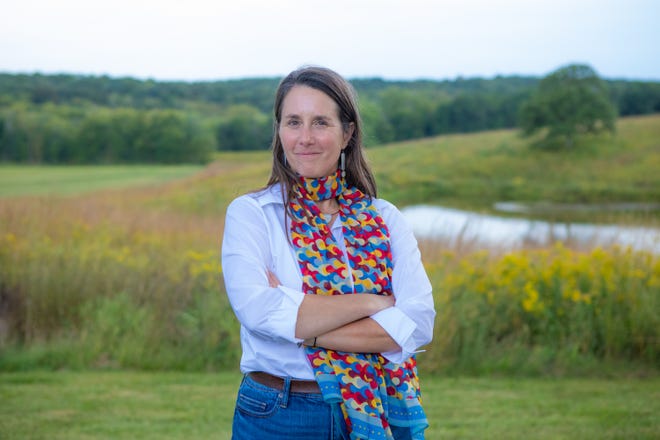Lisa Schulte Moore, a professor of natural resource ecology and management at Iowa State University, has been named the school’s first faculty recipient of a MacArthur Fellowship.
As a 2021 MacArthur Fellow, Schulte Moore will unconditionally receive $625,000 to be used toward her work, according to a news release from Iowa State.
According to the release, Schulte Moore’s research as a landscape ecologist has had her working with farmers to build “more sustainable and resilient agricultural systems. She pushes the boundaries of her field by incorporating other disciplines traditionally thought of as beyond the scope of ecology — economics, engineering and sociology, for instance — to address critical challenges such as climate change, biodiversity loss, water quality and rural depopulation.”
Schulte Moore said in the release: “I think of my work as putting together a puzzle, and I’m always looking for the missing puzzle piece. Where do I have to go or what do I have to learn to get the next piece? I’ve found that sometimes you have to build and paint the puzzle piece yourself, and that’s part of the fun of science.”
What’s the MacArthur Foundation, and how was Schulte Moore selected?
The John D. and Catherine T. MacArthur Foundation, founded in 1970 and headquartered in Chicago, “supports creative people, effective institutions, and influential networks building a more just, verdant, and peaceful world,” according to its website.
That’s meant foundation support for work including to prevent climate change, address over-incarceration and racial injustice in U.S. jails, reduce nuclear proliferation, combat corruption in Nigeria, support journalism and the MacArthur Fellows Program.
MacArthur Fellow nominees are brought to the program’s attention by external nominators, evaluated by an independent selection committee and then selected based on demonstrated creativity, nominees’ potential for future advances based on their accomplishments so far and the potential for a fellowship to facilitate future work, according to Iowa State’s news release.
The awards are sometimes referred to as “genius grants.”
Iowa State President Wendy Wintersteen called Schulte Moore someone who represents the best of the university and “a true land-grant champion. Dr. Schulte Moore recognizes the value of incorporating diverse disciplines to her research in order to address society’s urgent and complex global challenges.”
Only four other people have been named MacArthur Fellows while living in Iowa at the time
According to the MacArthur Foundation, since 1981, 1,061 people had been named MacArthur Fellows.
It was not immediately clear Tuesday if that number included the 25 people named as 2021 fellows, including Schulte Moore.
More:
In Iowa, she joins just four other people previously named as MacArthur Fellows while they had been living in the state — three of whom were in Iowa City at the time and have worked there for the University of Iowa:
- Timothy Barrett, a Western- and Japanese-style papermaker who was named a fellow in 2009 and who once served as the director of the University of Iowa Center for the Book. He is an Iowa professor emeritus.
- Nora C. England, an anthropological linguist who was named a fellow in 1993 and who has previously taught at the University of Iowa. England is the founding director of the Center for Indigenous Languages of Latin America at the University of Texas in Austin.
- Jorie Graham, a poet who was named a fellow in 1990 and who was a professor at the University of Iowa and on the faculty of the Writers’ Workshop, where she taught and directed the poetry program. Graham is a professor in Harvard University’s English department.
- Kent Whealy, a plant collector and preservationist who was named a fellow in 1990 while in Decorah. At the end of the Cold War, Whealy established a network of plant collectors in Eastern Europe and the former Soviet Union to save traditional food crops being lost to Western agricultural technology and seeds.
Seven other Iowa natives have also previously been named as MacArthur Fellows — including three in the past five years, journalist Nikole Hannah-Jones among them — but none were living in Iowa at the time.
More on Nikole Hannah-Jones’ recent work in Iowa:
More details about Schulte Moore’s research

Schulte Moore is a first-generation college student who received degrees in Wisconsin and Minnesota before joining the faculty at Iowa State in 2003.
Her research “addresses the integration of native perennial prairie plants into agricultural systems to support new markets and to protect water quality, soil and wildlife habitat,” according to Iowa State’s news release.
She and her team’s research have shown that strips of native prairie in agricultural fields can tremendously reduce soil loss and runoff of nitrogen and phosphorous by having more roots in the ground to hold soil and nutrients in place.
Prairie strips are now used on more than 115,000 acres of fields in 14 states, and the conservation practice has been federally recognized as eligible for government financial support by the 2018 Farm Bill.
Schulte Moore was also the lead developer of a computer simulation that shows how land use impacts soil, water, agricultural production and wildlife habitat, and she’s been funded by the U.S. Department of Agriculture to develop new revenue sources for farmers, particularly by using perennial grasses as a source of renewable natural gas.
“I’m working to show the full value of the Midwest’s native ecosystems and figure out how to turn it into financial value for farmers and rural communities,” Schulte Moore said.
“My work isn’t possible without great teammates,” she added. “I’m truly honored and humbled by this award, but I can’t do my work without the help and expertise of many people at Iowa State and beyond.”
Phillip Sitter covers education for the Ames Tribune, including Iowa State University and PreK-12 schools in Ames and elsewhere in Story County. Phillip can be reached via email at [email protected]. He is on Twitter @pslifeisabeauty.





More Stories
U.S. charges FTX founder Sam Bankman-Fried with criminal fraud
Time series forecasting with XGBoost and InfluxDB
Full-stack engineering is one-third as good